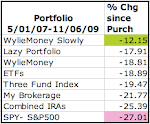What does this mean?
In general it means you never know what will happen tomorrow.
If you thought the market was ready to slump after its nice run up before 1999 and not invested in the beginning of 1999, in some cases you would have missed the largest one year returns we may ever see in our lifetime. Data courtesy Yahoo Finance for Janus Global Technology fund:

By all accounts, many of the stocks in this fund were trading at prices way above historical averages given what the underlying companies were earning, even before they proceeded to double in value in less than a year.
Stock prices and therefore fund prices are not driven by fundamentals, but by what people are willing to pay. Many people determine what they are willing to pay based on fundamentals, but many people do not. And in either case you still have to guess how you think the economy will do in the future. Had you invested at the beginning of 2000 thinking that this is a new economy and historical valuations do not apply because technology is going to enable corporate growth to expand at levels never before imagined, you would have been very sad by the end of 2002. Again consider Janus Global Technology:

Since 2002, markets around the world have gone up, almost across the board. Small and large company stocks have increased. Growth and value oriented companies have done well. Historically when oil prices have soared, economies have struggled as the added cost of manufacturing and transportation have been factored into the price of goods, lowering sales or reducing profits. Recently this has not been the case as companies across all sectors have grown and earned significant profits. Some claim tax cuts in the US are the cause, but European markets despite much higher taxes have trounced American markets so I am hesitant to attribute any single factor to these trends. Despite a long run of gains, stock price valuations are nowhere near as high as they were in 2000. So what does all this mean?
Beats me, I'm a philosophy major.
Some claim that current valuations are too high as they are calculated anticipating that above average growth will continue for a while which is possible, but unlikely given historical trends.
Some think the economy is ready to pick up steam. Would you trust this guy?

Others say things are not good, not bad.
One of the reasons the hypothetical portfolio I am creating here only holds funds that allow $100 or smaller subsequent investments is to not have to figure out how to time the market. My thinking is that if I buy a fund and contribute $100 every month, every 2 months or once a quarter, the exact timing of each purchase will not have a significant impact over the long term as the cost of the overall holdings will be the average of each purchase through up and down markets. If the sector the fund invests in grows and the fund managers make good picks, I should come out ahead.
I agree that you can not time the market, but you do have to determine a time to make the initial investment. And no advice works in every situation. If you had cash to invest in January 2000, the notion that you can't time the market so just buy when you have the cash, would not have been good advice. So even though I agree with the claim that you can't time the market, there are, good and bad times to invest and more importantly good and bad strategies for investing. And even if you buy into the Wylie idea of regular contributions, you still have to make the initial purchase which for the funds I am looking at are often a minimum of $2500.
So even though you cannot predict how markets will perform there are a couple of tools out there that you can use to see if it is a good time to buy or not and hopefully avoid buying at a market peak.
In part II I will talk about these tools and lay out a strategy for hypothetically investing in the Wylie hypothetical portfolio. Then I will pick the last few funds necessary to round out the portfolio and begin tracking the performance of the portfolio.



No comments:
Post a Comment